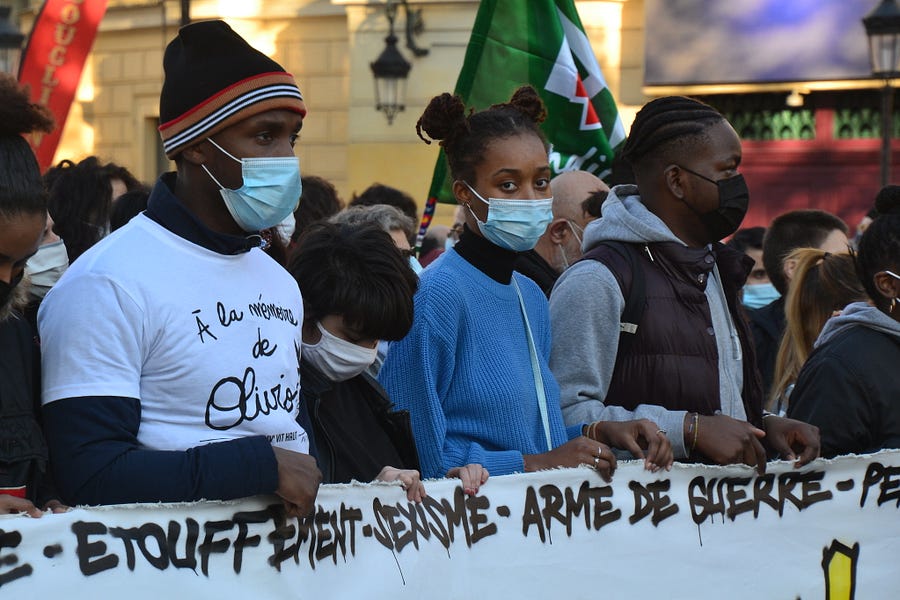Thousands of people in the streets protesting police violence, opposing an administration that cracks down on civil liberties, and outrage sparked by a brutal assault on an innocent black man: What sounds like America’s summer describes the streets of Paris last weekend. More than 5,000 people in Paris and about 50,000 all over the country protested a proposed law that would give the government new police powers. The so-called global security law would allow the use of live CCTV footage for law enforcement purposes and deploy surveillance drones for protests while at the same time ban the recording of on-duty police officers.
At the end of November, France’s National Assembly passed the legislation, which seeks to address increasing violent crime, particularly in cities. It has been tabled for now by Emmanuel Macron’s La République En Marche party, and Macron himself has vowed changes to the law. Civil rights groups have raised alarms about various aspects of the legislation.
With CCTV and drone footage at the disposal of law enforcement, it isn’t far-fetched to believe that facial recognition technology, which is very controversial in Europe, will also be in use. As French public radio reports, companies are already gearing up to provide the government with the necessary software as the technology is tested in different cities. In July, the European Parliament’s committee on civil liberties backed a moratorium on the technology, which it warns could undermine the presumption of innocence, liberty, and security. The United Kingdom, which has left the European Union, began to deploy facial recognition technology earlier this year.
The bill will also strengthen the power of local police, yet fails to provide any additional training for those officers. Most controversial in Macron’s police reform, however, is a ban on recording on-duty police officers. The government says that it seeks to protect officers from targeted violence, but civil rights groups say it undermines the very liberties law enforcement exists to safeguard. The change has a striking double standard—while police will have increased power to film citizens, the latter would not be able to document their encounters with law enforcement in video anymore.
What got legislators to take a second look at the bill was the violent attack by law enforcement officers on an innocent black man, 41-year old Michel Zecler, known for producing French rap songs. Zecler had left his apartment but quickly returned to pick up a face mask (which are mandatory in Paris). Three police officers followed him to his apartment door, forced their way in, and beat him for more than five minutes. They punched him more than 20 times, kicked him 10 times, and delivered about 15 baton hits, mostly to his face and head. The officers also hit his head with their knees and strangled him. The officers claimed Zecler had attacked them and dragged them into his home, but video evidence—from Zecler’s own home security system—showed this to be untrue.
Michel Zecler has accused the police of repeatedly using the N-word (which has equivalent meaning and severity in French as it does in English). The officers have denied making any racist insults.
Zecler’s call for help alerted the attention of young artists who were recording in another room, who came to his support. After initially fleeing the scene, the policemen returned to extract Zecler from his own home, breaking a window and throwing in tear gas. Neighbors across the street recorded as reinforcements arrived and proceeded to beat Zecler in the street. As the police officers became aware of the cameras pointed at them, they left the scene, taking the men into custody.
The badly injured Zecler was subsequently charged with assaulting police officers, trying to drag them into his home to attack them. But then his home security video was released by the French media outlet Loopsider.
Zecler could have faced prison time, but charges were dropped immediately after the release of the video, which garnered 15 million views and was picked up by all major broadcasters. It is unclear whether his recording could be used legally if the “law on global security” had already been in effect, but it has sparked calls to rewrite the proposed legislation.
On November 24, three days after Zecler’s beating (but one day before the release of the video), the government rewrote the provision banning the recording of police officers. However, the rewrites were not enough to placate critics. The revised text bans only “ill-intentioned recording,” which puts it on the courts to determine the intentions of people who record video. The bill will be considered by the French Senate in January, which has also promised to take a deeper look into the matter.
The amendment on the recording ban leaves excessive room for interpretation. Citizens need the protection of recording police interactions to minimize this exact room for interpretation, yet President Macron seems to side with police unions as opposed to citizens.
France’s debate on police violence has aching similarities with that in the United States. It shows the conversation surrounding law enforcement reform and police brutality is not specific to the U.S, and progressive governments can also side with the police. In September, German police officers were fired for sharing neo-Nazi content, opening a larger conversation of far-right ideologies and proper screening in the forces. Similarly, accusations of racism hanging over the Zecler case will have lasting effects on the French protests, likely to continue for weeks.








Please note that we at The Dispatch hold ourselves, our work, and our commenters to a higher standard than other places on the internet. We welcome comments that foster genuine debate or discussion—including comments critical of us or our work—but responses that include ad hominem attacks on fellow Dispatch members or are intended to stoke fear and anger may be moderated.